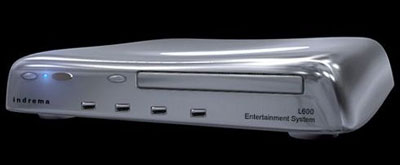Evil Avatar heeft vandaag een interview online gezet met John Gildred, een CEO van Indrema. Indrema is een nieuw bedrijf dat van plan is consoles te verkopen die op Linux draaien en waarvoor opensource spellen beschikbaar moeten komen. Het eerste product van Indrema is de L600, een vrij krachtige PC-achtige machine met een aangepaste Linux versie, die in de lente van volgend jaar voor het eerst op de markt moet verschijnen, tegen een prijs van bijna $300:
John Gildred: Indrema is a new company dedicated to producing high-quality home entertainment devices. L600 is the project name for the first Indrema Entertainment System (IES)--a Linux-based next-generation video gaming console intended for the hard core gamer. The IES L600 is an x86 based platform running at 600 MHz with 64 MB of main memory. The GPU is a next-generation nVidia GPU with 32 MB of DDR fame buffer memory. The IES will ship with a 10 GB hard drive, progressive-scan DVD player and Ethernet connection.[break]Op de vraag of Linux wel geschikt is om spellen op te draaien aangezien het huidige aanbod voor desktop PC's ook niet denderend is antwoorde John het volgende:[/break]A video game console, in its essence, is simply an embedded device. The operating system matters not a whit to the end user-- for instance, most Dreamcast users don't realize that DC runs a version of Windows for some functions, because the OS is transparent in embedded devices. It will be the same with Indrema. The only difference is that, unlike Windows, Linux is an ideal platform for embedded devices. It's efficient, stable, and lean (unlike Windows, which is expensive, buggy, and bloated.)
Best of all, Linux is customizable -- you can tweak it to work best for any particular device. For instance, for the L600 we've created our own distribution of Linux (called DV Linux, see specs below) which is optimized for gaming and multimedia applications.
Aside from the technical benefits of Linux, there is another, more important, reason why we chose it to run the L600-- it is Open Source. What Open Source means is that all of the source code for the OS and its associated APIs is freely available for anyone who wants it. This has numerous benefits for both developers and end-users (see below).

